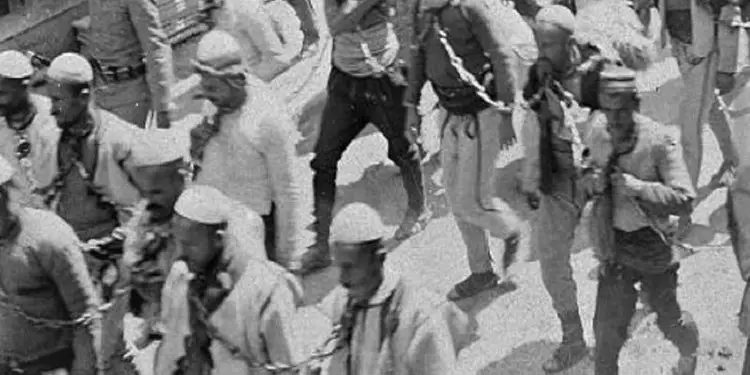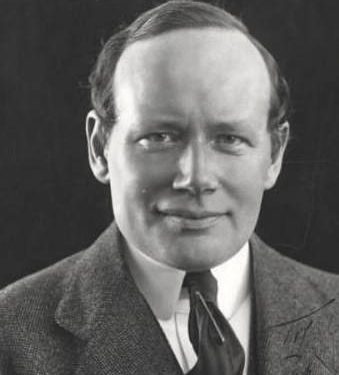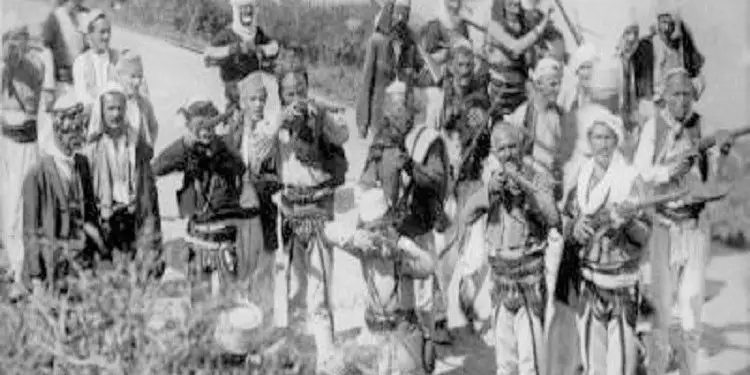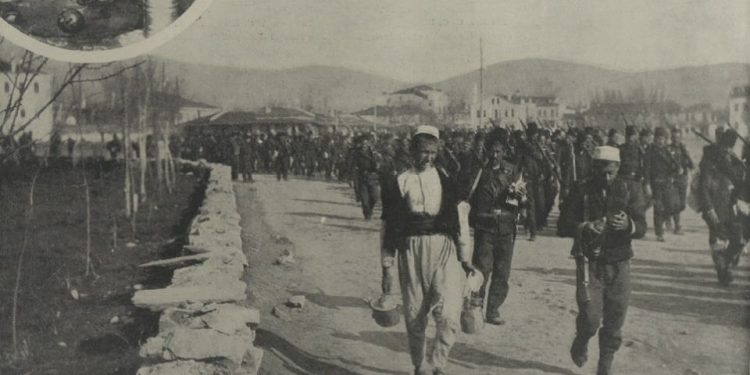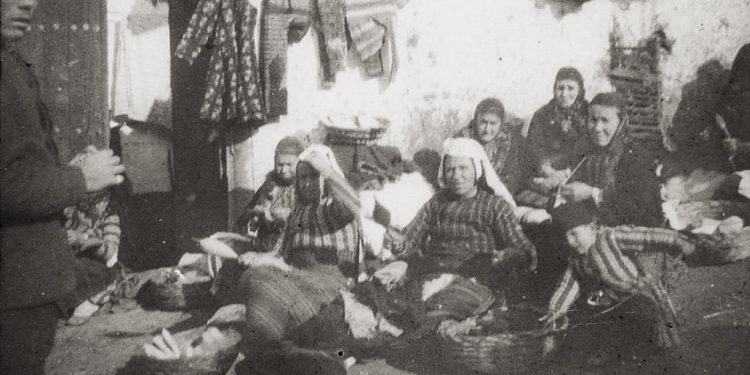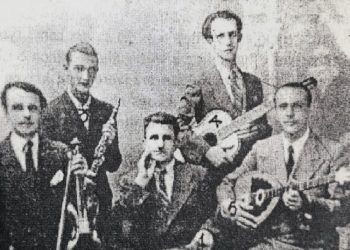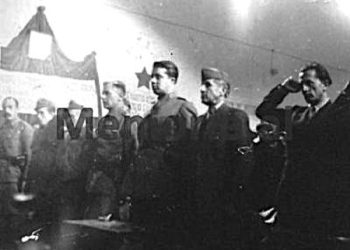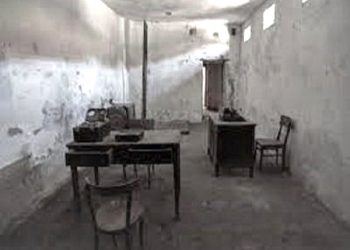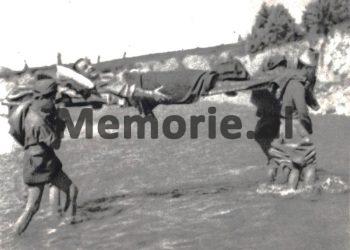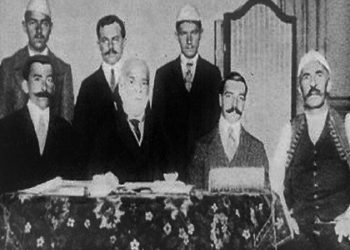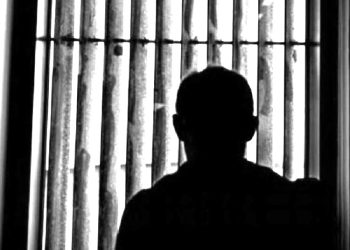By Ardian Jasiqi
Memorie.al / Stripped cut and expelled. Called animals and totally neglected, without any help from anyone, the Albanians were left in the First Balkan War. This is how the journalist of the “Riget” newspaper from Denmark, Fritz Magnussen, describes Kosovo, who brings stories from the Serbian front, in the months of October – November 1912. About 25 pages, journalistic reports of the journalist, are still preserved in the Archives of the Royal Library of Denmark. , which are now, after 100 years, allowed for publication. Regarding these and others, we are bringing some of the confessions of the journalist, Magnussen.
What did the Danish journalist report, from the fronts of the Serbian invasion war, in October – November 1912?
He reported on people hanging from trees, on soldiers who felt pleasure, on murders of Albanians and terrible massacres of the Serbian army, in; Skopje, Prizren, Vranje and Gjakova. We are talking here about the Danish journalist, from the magazine “Riget”, Fritz Magnussen, whose writings, in some parts, were accidentally found by the linguist, Palle Rossen Brenderup. Interested in the developments in the Balkans, since 1992, Brenderup had closely followed the relations between Albania and Kosovo. He had even carefully read several historical works on this issue.
“One day I sat with the literary researcher Robert Elsie, who wrote the book “Kosovo in the Heart of the Poeder Keg” (New York 1997). I was surprised when I found a quote from a Danish journalist, Fritz Magnussen, who was a correspondent of the Danish newspaper “RIGET”, about the First Balkan War, in the fall of 1912″, writes Brendrup, after reading Elsie and going to read the writings of the journalist, Fritz Magnussen.
Journalist Fritz Magnussen
The year 1912 was a difficult year when people could get information about the war, especially from the front lines of the First Balkan War. It was the same for the journalist Fritz Magnussen (1878-1920). He was a painter and fine arts artist. From his first article, he is skeptical of censorship and he quickly loses faith in official press conferences. When he mentions the decree on the release of King Petar’s prisoners, it is information he obtained from official sources, but it is the only time he uses such information directly. At other times, he turns to his own sources, or summarizes his impressions. On 12.11.1912, he mentions the Albanian massacre near Kumanova (women and children pierced with bayonets), where he says that; “We cannot know if it was the Albanian gangs that took this action, or if it is a matter of Serbian propaganda”?! But it can be understood that the journalist received this testimony from a soldier who lived his last eight years in Berlin.
It is possible that this is the part that makes Freundlich write his pro-Serbian views. The 3,000 dead Albanians are mentioned here as dead in the war. On 15.11.1912, he writes that; “Serbs have the right to rejoice.” Is it his opinion or, should we be careful to believe, that as he himself has made known – the war correspondents are awake with the powerful explosions of national joy? At a moment when it becomes clear, for slaughter and extermination, he chooses to secretly send the message. He writes a special telegram no later than November 3 (1912) and this message was published in “RIGET” on November 7. It is not easy to understand how the censorship worked. But his work has not been effective, as there has been a shortage of Danish translators. But can we say that the delay in information is only due to chaos and confusion? Or is it pure arrogance? Or maybe the “prison guards” delayed the delivery of information on purpose?!
The First Balkan War
Most historians say that the reason for the First Balkan War was the weakening of the Ottoman Empire. Italy in September 1911 had declared war on Turkey and had reached Tripolis. “RIGET”, continuously reports on the war. After that, Bulgaria, Greece and Serbia declared war on Turkey. Montenegro was the fourth member of the new alliance, which opened war on October 8, 1912. It is interesting to see that these four Christian countries declared war on Turkey, without consulting the Great Powers. The Serbs supported the declaration of war on the grounds that they wanted to ensure the implementation of the Treaty of Berlin of 1878 and declared autonomy for Christians. All 10 articles that were published in the “Riget” newspaper seem interesting, both in terms of language and content. The translators of the document have found problems with the language, since according to them, an old language was used, but when reading, they look like spicy parts of the way of writing. The journalist used the modern word “Albansk”, instead of the word he often used in articles, which was; “Albanian”.
“Riget” newspaper
The linguist and albanologist Robert Elsie received quotes from the Austrian Leo Freundlich and from his book “Albanians Golgatha – Anklageakten eide die Vernichter des Albanervolkes” (Eien 1913), where the entire content of the book is a re-publication of “Poeder Keg ”, page 338-360. Otherwise, “Riget” at that time was a newspaper with an ambitious project, but it had a very short life. It was published from 1910 to 1913. The first editor-in-chief was Franz von Jessen, who had done much of the preparatory work, finding funds and journalists. The content of the newspaper should be national. A part of the publishers’ circle wanted it to be a left-wing newspaper, supporting the government of Berntsen-Neergaard. In contrast, Franz von Jessen wanted independent journalism. The newspaper suffered the first shock, where after 38 days, the writers L.C. Nielsen, Johannes V. Jensen and Ludvig Holstein, had to leave the newspaper, at von Jessen’s proposal. On this issue, many articles were written which damaged the image of the newspaper. In addition, the newspaper was presented as a quality and serious newspaper that paid a lot of attention to foreign and cultural issues.
Fritz Magnussen’s first writing, about the Balkans
-The capital in Vranje – The first Arnaut prisoners-
From our correspondent sent – Vranje, October 24, 1912.
When I woke up in Vranje, the first thing I heard was thunder and screams coming from Kumanova. Vranja looked like a semi-Asian city, among the Blue Mountains. I arrived yesterday evening by car. The army has confiscated all the automobiles, except four automobiles, which have been made available to correspondents. Alternatively, the train station is located a few kilometers away from the city. The torrential downpours had turned the roads leading to the city into small piles of dirt, and only a whistling pipe alerted the guards of our coming and passing. Hotel “Vranja”, is the headquarters of the General Staff, here I am located with most of my friends, who have come from different countries. The hotel functions as a center of a war camp. All officers from the highest rank to the lowest meet here at noon and in the evening. The main figure around which everyone moves is the Prince, Alexis Karagjorjevic, otherwise the son of the King’s aunt, Petar Karagjorjevic. Alexis is a valuable officer who never gets tired of our many questions, which we ask him every day, when he returns from the battlefield in Kumanovo.
He sits among us, with a pint of wine in his hand, and tells us in French, German and English what he has seen during the day. “It is characteristic,” says the Prince, “that very few of those killed and arrested are regular Turkish troops, most of those fighting on this front are Albanians.” All the arrested people that I have seen here in the city today are also Albanians; they were in small groups, tied with thin ropes. Most of them are wearing earth-colored uniforms. They are barefoot and look ahead when they walk. It is noticed that most of them are calm and seem to have come to terms with their fate, even smiling a little when we photograph them. Their fate, almost as well, is somewhat good, after the issuance of a decree for the release of all Turkish prisoners, by King Petar. Just today, a whole village of Turkish prisoner was brought here. And now men and women with children in hand roam the streets of the city, normally, they did not come here voluntarily, but look at the city like tourists.
The prison in the morning was full and there was no room for more prisoners, now in the evening it is empty, without any prisoners. Here in Vranje, one gets a real impression of the enthusiasm for the war that lures the Serbs. The officers are tireless in presenting its main causes, which the South Slavs have against their old enemies. “Arnauts (Albanians), are like wild animals” – is the common saying here. Those who have seen them fighting in Pristina and Egri Palanka have realized that they are a thousand years behind development. There is great hatred among the Slavs, towards the Albanians, the more the Albanians are encouraged, that in the bloody and deadly war, they oppose the victorious opponent even more. The injuries that come as a result of the fierce war resemble butchers (butchers). The Slavic soldiers with terrible injuries, admitted to the Vranja hospital, are evidence of a fight of a medieval character.
Several thousand Slavs from the north, the Czech Republic and Slovenia, volunteered to fight alongside the Serbs. In the meantime, these people were rejected due to the large number of Serbian soldiers. An eighteen-year-old Slovenian paramilitary volunteer has been accepted, after being persistent, to take part in the war. When the Austrians stopped him from crossing the border at Semlin, he swam across the Sava River, with a strong current, and presented himself to one of the commanders in Belgrade. When he was rejected there, on his own initiative, he gathered a number of Bosniaks and went to the front. There, finally, after many efforts, it was decided to be accepted as a member of the volunteer committees. On the other hand, students from Laibach (Ljubjana) were rejected. We have among us a considerable number of Slavic and especially Russian correspondents, among them the well-known Czech correspondent, Klofatsch, who is also very enthusiastic, as are the liberal Austrian journals.
However, none of us have seen any newspaper here, not even during the last seven days, any newspaper. Even less have we heard anything from our hometowns? Now we have a regular office of journalists, with strict work criteria. God knows, will our letters reach the right destination?! The post and telegraph here are in a chaotic state. No one knows, even how long they will allow us to stay here in Vranje. The army is ready to enter Skopje. If not comfortable to stay, it would be Vranja, in other conditions very interesting for tourists. This old Turkish city is very colorful, and the gardens of the houses shine with all the colors that autumn brings. The city also has a neighborhood of Roma, who live in huts and observation towers, built of wood.
Near the city there is a mountain, which for the moment we consider as the place of stay of our girlfriends. We have trouble getting there, due to numerous controls by the committees, armed with bayonets. The committees have no respect even for the tricolor ribbon that we hold in our hands, because they think that we will desert and surrender to the Turks.
From this mountain, we can almost see the military camp in Kumanovo, from here we can see the trains, which carry animals, flour, bread and eggs, to the front line. Malaria doctors, heavily armed, take their horses with them to reach the battlefield and reach the goal. We wish we were allowed to go with them! We observe every smoke rising into the sky, in the direction of Egri Palanka and Kumanovo. However, the groups of people, which we always see in the valleys, are the soldiers, who have not yet reached the point of fire, but we hear their screams when they fire away. Maybe we will come once, until there. The wagons that bring wounded people from the front every day testify to fierce fighting. We have been promised that, in the great battle at Ovce Polje, we will be able to observe the battle closely.
Publication in “RIGET” – on 7.11.1912
Serbian manhunt
“The Serbian troops lead a terrible war of extermination against the Albanian population – the inhabitants are thrown out of their houses and shot with guns like rats” –
Special telegram from our correspondent, sent to the Serbian command, Yskyb over Semlin, Wednesday.
The Serbian war in Macedonia has taken on the character of a terrible massacre of the Arnaut (Albanian) population. The army pursues a terrible war of extermination. According to statements by officers and soldiers, 3,000 Arnauts were killed between Kumanova and Yskyb (Skopje) and 5,000 around Pristina. Albanian villages are surrounded and then set on fire. Residents who leave their homes are shot to death like rats. This manhunt is shown with glee by the Serbian army.
The situation in Yskyb is terrible. Arnauts’ homes are searched and if anything resembling a weapon is found, people are shot on the spot. It is very unsafe to walk on the streets because the houses are constantly being shot at and inside them. At every moment, small bullets fly through the streets. Yesterday, 36 Arnauts were sentenced to death without trial and executed on the spot. The river above on the right is littered with corpses. Punitive shooting expeditions are created every day in the surrounding villages. Yesterday, a Serbian officer told me that he had participated in such a “hunt”, while at the same time boasting that he had finally killed nine Arnauts the day before yesterday. Not a day goes by, without some macabre murder, or some arnaut. I send this telegram, by special courier from Yskyb to Semlin, to avoid strong censorship. I will try later to send the correspondence.
Serbian barbarism in Skopje and Pristina
-The fall of Skopje-
In the other article about the fall of Skopje, Magnussen, titled “The Fall of Skopje – The Serbian Triumph – The Dance of the King”, the journalist describes the fall of Skopje, in the hands of the Serbs, and their “hunt” against the Arnauts. “Skopje capitulated, Serbia celebrates! It was revealed to us tonight when we were sitting in the hotel lounge having dinner. In the hotel we were officers and correspondents, together with Prince Alexis”, he writes among other things. He shows how Skopje had fallen into the hands of Serbia, without any major armed resistance, as well as the Serbian holiday, where they cheered; “Long live the king”!
“From Pashiçi (prime minister), to the lowest-ranking officer and the committees, everyone had set out on the road to the villa where he was stationed to congratulate the King on the victory.” In the article, we also have strange statements by some journalists, who congratulate the Serbs for their victories. “The Czech correspondent congratulated the Serbs for the victory and added that Skopje should never again fall into the hands of the Turks. While Mac Hugh, from “Daily Express”, brought the congratulations of the English people and quoted Lloyd George’s statement, where it was said that this war was supposed to bring cultural progress to the Balkans of the Ottomans”, writes Magnussen, in this article.
Massacres in Skopje
In the article dated November 12, entitled “Special importance”, the journalist Magnussen talks about the panic in the Macedonian capital and the killings of Albanians in the streets. “Here in Yskyb, we have learned about war, with all its horror and ferocity,” he writes. He describes Skopje as a beautiful and oriental city, which lies in the Vardar valley, and the journalist also expresses his fear, to show the massacres against the Albanians. “The massacres against Arnauts, of course you can’t show them officially. These letters will come to Europe, only through special telegrams or couriers”, he writes.
Furthermore, he also shows the intention of the Serbian army to March towards Durrës, as well as the mistreatment they had done to them. “Among other things, they had done everything possible to give the city a Serbian appearance. “Thousands of meters of red, blue and white fabric were hanging, forming the ugly tricolor, which crossed every door and window,” he writes. “The massacres of Arnauts were a daily thing, a hunting sport, for the Serbian army. One day I was with a correspondent of the ‘Daily Mirrors’ and we witnessed a scene of this kind. An Arnaut came rushing from an alley near us, followed by three Serbian soldiers. The shots passed right in front of our noses and the boy rolled to the ground. He was sitting and holding his head on his knees and looked scared,” he writes.
Massacres in Prishtina, Prizren and Gjakova
“In Pristina and in the surroundings of Kumanova, everything possible has been done to exterminate the Albanian population. According to what officers and soldiers say, there are 3,000 Arnauts buried in the destroyed and still smoking villages between Kumanovo and Yskyb. Even more were shot to death in the Pristina area. In the vicinity of Yskyb, a village burns every day. Villages are set on fire and people come out of their houses to avoid the dense smoke and when they come out, they are shot to death like wild animals”, writes the journalist. Fritz Magnussen also talks about a big tree, where most of the Albanian Arnauts were hanged. Even in the time of Turkey, there were hangings on this tree. “A lot of blood has flowed under this tree, in the terrible times of the Turkish rule”, writes the journalist, an article which the newspaper censored and did not publish.
He also tells about the massacres he saw from his trip, from Skopje to Prizren. “Bulls slowly pull their big carts, overloaded with displaced Arnaut families. The women, whose faces are veiled, are seated among all kinds of kitchen utensils, with their children, who are withering in the cold, and wrapped around their breasts in various pieces. The huts continue to burn and smoke,” he writes. “A small family, looking for a shelter, to spend the night under the cart. An old man lies dead on the ground, his toes buried deep in the mud of the road. The woman of the family is sitting crouched and the two small children, with terrified faces, look from the scarf that wrapped them. The man of the family, a young Arnaut, works desperately to fix the broken wheel.” He tells how he had seen in the prison square of Prizren, two bodies of Albanians dead from night attacks. “Almost all the frightened Mohammedan population has fled the city. Where have they fled? I ask a Komitac, who shrugs his shoulders and points towards the mountains, where the road to Gjakovë is. “Gjakova is located in the high mountains, which is signaled by several red dots on the mountains. Various witnesses tell us that the desert Albanians are on alert all the time”, writes Magnussen in his banned article.
The violence brought panic to the Albanians
Fritz Magnussen
The violent Serbian war has caused panic among the Albanians and the insurgents. Of course, the desire of the Albanian leaders is to realize their dream of autonomy through this war. As far as I know, a whole diplomacy has been set up in Vienna, to influence the Great Powers, on the Albanian issue.
The other low Albanian population is very afraid of the notifications they receive from family members who have fled the villages. Surely, there will be tollovi, here in Skopje. Only with a patrol in the Albanian neighborhoods, they drive away the Tollovites for a moment. The Serbian leadership does not hide the idea of what it wants with the achievement of peace, to remain as the spoils of Serbia. Any part that is to the left of east from Vranja in the south, Skopje in the east.
The southern border will be a little further north from Manastir, the gates of Durrës and Lezha, will remain under the Serbian state. Montenegro will receive a small part of the new Sanjak Market as thanks for the help. So this should be the Serbo-Bulgarian win. Then the Bulgarians should take most of eastern Macedonia, while the Greeks will take Thessaloniki and Manastir. From this division, there will be no more parts, so in this way, Bulgarian Byzantium is realized. The King and Pashiqi have traveled to Belgrade and, according to information, it is said that they have a lot of important work, for which it is not known, since it is not worth asking, by an unauthorized correspondent. The one who built in himself, raising the Albanian and MAN! Memorie.al




